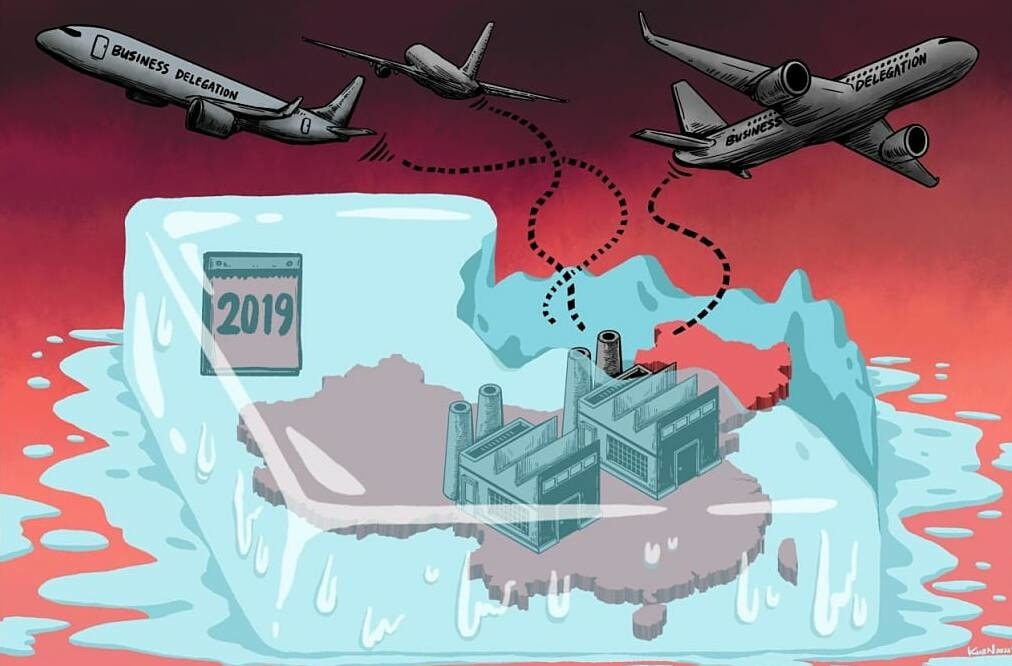Chinese businesses go abroad to find orders again
Local governments across China are rushing to send business delegations abroad to try to regain orders.
On his first overseas business trip in three years, Chen Yuan, an exporter of computers and mobile phone accessories, chose Dubai as his destination. He described meeting with long-time customers as "a nice reunion of old friends."
"For three years, they didn't go into China, and we didn't go out. One customer was very happy and told me, 'It's been a long time since I've seen a Chinese face,'" Chen said.
It was December 6, when Chen and about a dozen businessmen and officials from Ningbo (Zhejiang) went on a trade promotion trip. After four days of meeting with old and new customers and attending trade events in the Middle East, they flew to Jakarta for a similar activity.
On the day Chen arrived in Indonesia, a group of Jiaxing businessmen had just returned from Japan on a chartered flight organized by the city government. They included 90 representatives of textile companies who were attending the three-day Asian Fashion Fair in Tokyo.
 |
Graphic image depicting the wave of trade promotion to reconnect China's supply chain.Source: SCMP |
"In the past, going abroad to meet clients was very common, so we didn't cherish the opportunity as much as we do now," said Shen Wei, a businessman in the Jiaxing delegation.
As China begins to ease anti-epidemic measures, local governments are rushing to send business delegations abroad, trying to make up for three years of lockdowns that have caused exports to dwindle and foreign investment to plummet.
Over the past two months, leaders from Zhejiang, Jiangsu and Guangdong — major export hubs — and economically strong provinces like Sichuan and Shandong have joined business leaders to attend trade fairs and forge new relationships in Europe, the Middle East, Asia and Africa. For most, it was their first overseas trip since Covid-19 emerged in late 2019.
Gao Zhendong, a consultant to Chinese companies looking to invest in Southeast Asia, said this was a positive and necessary signal for the country's manufacturers and exporters. "We expect a bigger boom in such trade activities early next year," he said.
Some trade challenges can be overcome by maintaining good relationships with customers, ideally through face-to-face interactions. But most Chinese exporters – especially small and micro-sized ones with tight budgets – have been hampered by a variety of regulations, including lengthy hotel quarantines upon return, expensive international airfares, trip cancellations due to the pandemic, and visa denials.
But now, in addition to subsidizing some of the flight and hotel costs, government-sponsored trips also guarantee that visas will be processed smoothly and return flights will be available, which is important for business people considering venturing abroad.
“Just sitting together and talking is more helpful than writing hundreds of emails,” said Shen, who recently negotiated a new $1 million order after meeting with a client in South Korea for the first time in three years before his trip to Japan.
Finding new customers is even more urgent for Chen, who has seen his market share in the US – previously his biggest export destination – shrink since the Trump administration imposed 25% tariffs. "Demand from Europe is also falling; the energy crisis and Ukraine are also affecting us," Chen said.
Expanding into the Middle East and Southeast Asia was Chen's goal when he joined the delegation organized by the Ningbo government. "If I didn't go abroad, I wouldn't have had the chance to meet those potential customers," Chen said.
China still requires people entering the country to spend time in quarantine at hotels and at home. International flights have not yet returned to normal, so those who can travel abroad are still in the minority.
Despite the hurdles, some exporters have found the costs of being stuck in China so high that they are forced to go abroad themselves rather than wait for the government to take the initiative. Lu Hua, the owner of a precision parts and molding company in Guangdong, visited North American customers in October and is preparing to open a new factory in Vietnam.
His group returned to China in late November, before Beijing relaxed its anti-epidemic policies. Lu was worried that he would be caught off guard by customs officials and risk being denied exit approval upon departure. But a few days after his return, he noticed a sudden change in the government's attitude. "From the top leadership to local governments, exporting companies were encouraged to go abroad to attract more export orders," Lu said.
U.S. containerized imports rose 0.2% in October from September, but imports from China fell 5.5% to 45,071 TEUs, according to data from logistics consultancy Descartes. The decline from China was offset by increases from Thailand, South Korea, Taiwan, Japan and other countries.
Exports fell 8.7% year-on-year in November, after a 0.3% decline in October, according to China Customs data. Many local governments plan to send more delegations abroad to try to revive orders, but most economists expect exports to fall further in the first half of next year as the global economy slows.
Chinese exporters are also worried about fiercer competition as their market share shrinks. Shen said the overall environment is very harsh. Meanwhile, Lu said the government needs to do more to restore foreign customers' confidence in the country's supply chain.
